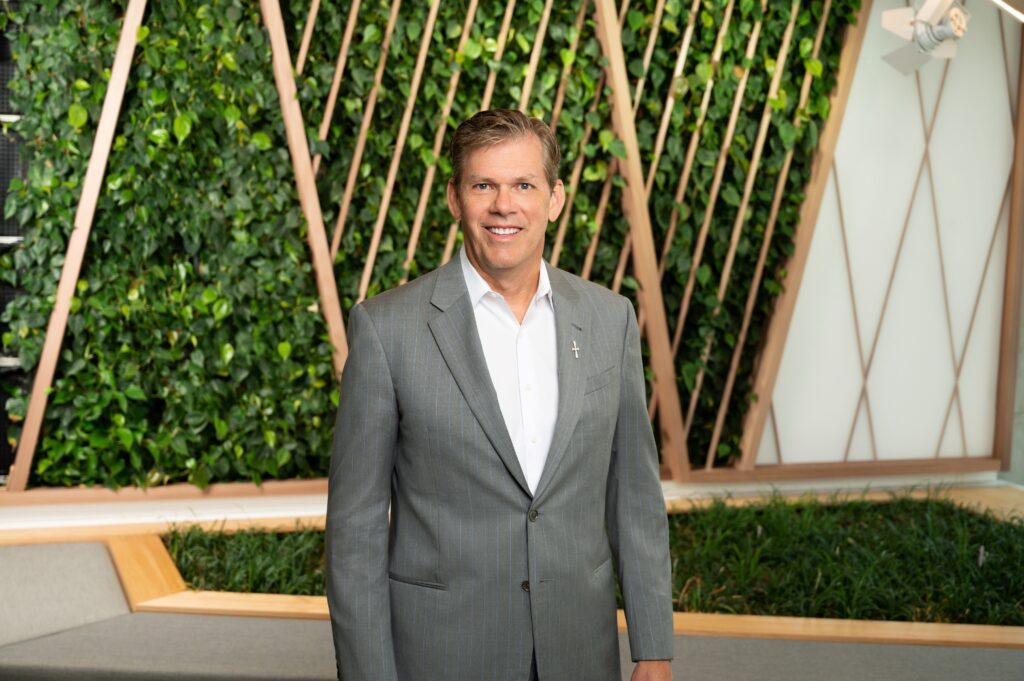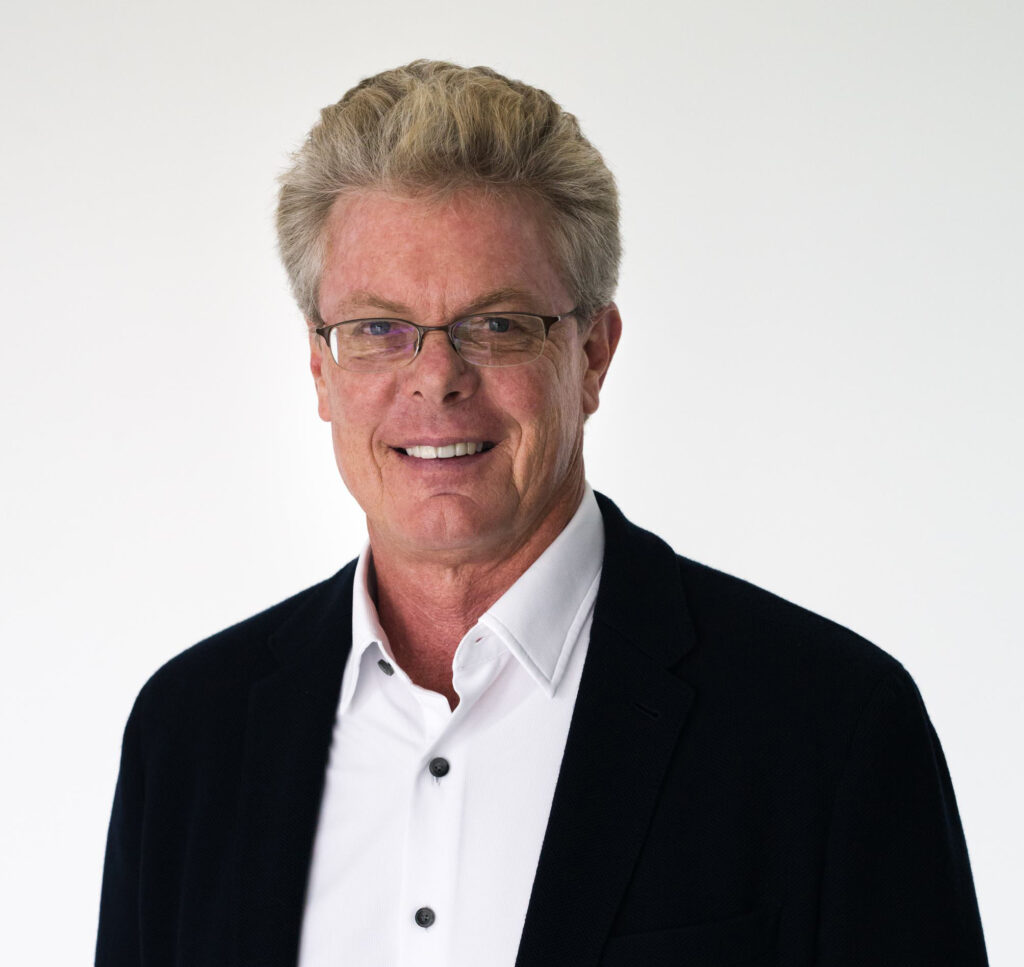Making a Difference For Texas Veterans
- October 10, 2023

Chip Fulghum learned the finer points of service when he was in the Air Force. He learned what it meant to serve from bosses who taught him the value of service. Over time, the military became a way of life for him, a way to give back and a way to serve others. But that’s not how it started.
Fulghum grew up in a small town in North Carolina near the Seymour Johnson Air Force Base. Despite the base’s proximity, he says he didn’t know much about the military other than his father served overseas for two years. When it came time to choose a college, he didn’t think he would be successful at a traditional institution, so he chose to attend The Citadel, a South Carolina military school with the stipulation that ROTC was a requirement to graduate—not to enroll but to graduate.
“About half went in, half didn’t,” Fulghum says. “I’d like to tell you I joined because of education and this service, this passion to serve. I didn’t really have that at the time, but they were offering a hundred dollars a month. I had zero.”
Graduating with a bachelor’s degree in history, Fulghum signed up for a four-year stint in the military and ended up spending 28. He served in the Air Force’s financial management system throughout his military career, overseeing the needs of airmen around the world and ensuring they had what they needed to do their jobs. He did three tours at the Pentagon in Washington, DC, and spent time at the major air commands, including the Air Education and Training Command, and tours at base level.
In Texas, Fulghum is one of more than 1.5 million veterans who live here, according to the US Department of Veterans Affairs. Texas has the second-largest population of veterans in the United States, coming in behind California, which claims more than 1.6 million veterans. The US Census Bureau lists some 2,700 veterans experiencing homelessness in the Lone Star State, an issue Fulghum battles in his current role as president and chief operating officer at Endeavors, a San Antonio-based nonprofit that provides social services to vulnerable populations.
Established in 1969 by five churches in the San Antonio area, Endeavors began its mission with a focus on helping the unhoused population in that area. More than 50 years later, the agency’s scope has grown to include shelters for single women and their children, mental health services, disaster case management services including hurricane relief, and migrant services. Some of Endeavors’ latest work has centered on veteran services through The Steven A. Cohen Military Family Clinics at Endeavors and the Veteran Wellness Center (VWC).
Last year, Endeavors provided more than $3.4 million to veterans in need across 109 Texas counties through homelessness assistance, utility assistance, and essential items, according to its 2022 annual report. In 2021, Endeavors opened its first VWC in San Antonio. The center provides mental and physical health services through offerings such as yoga, group fitness classes, and a state-of-the-art fitness center. Last year, 3,634 people used the VWC’s services, and the organization broke ground on a second VWC on 10 acres in El Paso and hopes to have it up and running in early 2025.
After his Air Force career, Chip Fulghum spent seven years with the Department of Homeland Security before he transitioned to the private sector to become president and chief operating officer at Endeavors, but he sees both jobs as ways of serving his country.
What spurred your move from Homeland Security to your role at Endeavors?
I learned what service was all about in the Air Force. So, to me, public service was just another way to serve. You’re just serving the nation in a different capacity. When someone asked me about going over to Homeland Security and becoming, at the time, the budget director, I said first I had to figure out what Homeland Security was. I didn’t know a lot about that agency because it was relatively new. But then to see the mission [of Endeavors], the importance of that mission, and how service and serving in that capacity would be another way to give back, I applied for the job, and I was fortunate enough to be selected.
How does your military background influence how
you lead?
What I’ve learned through the years is people are people, and the one thing the military taught me is if you just treat people the way you want to be treated, you’ll probably do okay. I’ve tried to carry that over and look at the organization and flip it upside down. The only reason I’m here is to support the people right above me now, which actually are the people below, if you think about flipping it upside down. If you carry that out throughout the whole organization, then you get the idea: We’re only here to support those who work for us. But, we’ve got to support them, get them the resources they need, and provide the right type of leadership.
Ultimately, it’s about making a difference. We look at it as if we serve one client at a time, and if we’ve made a difference for that one client, then we’ve made a difference that day. That’s what you learn in the military—how to go about making that difference in those you work with, those who work for you, and even those you work for.
Who have been your mentors?
Several, and I would say, you learn from the bad as well as the good. But one is Major General Alfred K. Flowers. I worked for General Flowers when I was at Air Education and Training Command. He was the chief financial officer of the command. Then I worked with him again when he was the director of budget for the Air Force.
General Flowers is the longest-serving airman in Department of Defense history, 40-plus years of service—started as an airman in Vietnam, rose to the ranks of two-star. What a humble guy and the true definition of what servant leadership is all about. He’s certainly one of the foremost folks who taught me a lot about leadership and taught me about what it means to serve others and to give back. His book, Reflections of a Servant Leader, is an excellent book.
Tell us about the origins of Endeavors.
We’re a faith-based organization that was founded by five Presbyterian churches in 1969 with a simple mission, and that was a mission to serve. At the time, there was a significant homeless population—a pretty bad problem—here [in San Antonio], and Louis Zbinden, the pastor of the First Presbyterian Church, came to the church one January. It was really cold the night before, and a homeless individual had perished. Zbinden was committed from that point on to not let that happen again because the church was put here to serve.
Out of that, a lot of organizations responded, including Endeavors, and we never lost that mission to serve others. Today, we have community-based services. We have emergency services. We do a lot with behavioral health, particularly as it relates to veterans and their families, and then the migrant services line. In regard to migrant services specifically, we’ve been supporting those operations for more than a decade. We’ve done more than 35 deployments in support of those operations, primarily as a sub-vendor to others; 2021 was the first time we were the prime vendor for those operations, but we’ve been doing it for well over a decade.
When you say operations, can you give an example?
One example is an influx care facility. Whenever there is a surge of migrants coming across the border seeking asylum, the Health and Human Services Office of Refugee and Resettlement has a permanent shelter network set up. They have so many beds available for unaccompanied children coming across the border. When there’s a surge and they don’t have enough bed capacity, they stand up influx care facilities, which are more temporary in nature, to deal with that additional overflow that they have because they don’t have enough permanent bed capacity.
In 2021, when there was again a crisis at the border and a record number of unaccompanied children coming across, sites went up across the United States to meet that demand. Because what you’re trying to do is get these kids out of Border Patrol care as fast as possible because Border Patrol was not set up to care for this type of population or hold this type of population. It’s primarily set up for single adults, not families or unaccompanied kids. The government looks for organizations such as Endeavors to help provide that capacity in times of crisis.
What did last year look like? Reports cited some 2.76 million migrants came across last year.
That number includes single adults, families, and unaccompanied children. I believe it was a record year for unaccompanied children at the end of 2022, and migrations are typically seasonal in that they go up and down. This one has been steadier over the last couple of years, and the government needed organizations like us to step up and help.
At the end of the day, we’re a humanitarian organization. Serving this population meets our mission. Our mission is simply to serve vulnerable people in crisis, and if unaccompanied children coming to the border seeking asylum don’t meet that mission, I don’t know what does.
When did veterans enter Endeavors’ purview?
We began serving veterans who have become homeless or about to become homeless in 2012. We’ve been a provider of those services on behalf of the Department of Veterans Affairs (VA) since 2012. If you’ve served in the military and you find yourself at risk of becoming homeless or are experiencing homelessness, one of your earned benefits is to come to organizations like ours that the VA has contracted with. Our job is to help 1) housing first, get you back into housing, and then 2) not only help you with that temporary financial assistance but really do the case management work to figure out what drove you to homelessness and then help you back on the road to recovery so that it doesn’t happen again.
We got into the mental health and behavioral health business as it relates to veterans in 2016. The Cohen Veterans Network (Steve Cohen, who now owns the New York Mets, and whose son served in the Marines in Afghanistan) developed after Steve’s son came back and said, “Dad, my friends can’t get access to mental health care as fast as they need to from the VA.” He’s put his money where his mouth is and stood up 25 clinics across the United States with the purpose of providing mental health support to veterans and their families. The veteran can determine who that family member is. It may be a caregiver, maybe a partner, could be a child, could be a spouse. About 50 percent of the folks we see in our Cohen clinics are family members. About 25 percent of those are kids.
We were the first one outside the clinical research facility. They stood up in New York, then here in San Antonio. We have two more, one in El Paso, one in Killeen. There’s also one in Dallas. We’re very privileged to operate those on behalf of the Cohen Veterans Network and serving the mental health needs of veterans, active duty, and their families. Then we began to see an even bigger need for veterans and their families, and it’s around the idea of wellness as it relates to suicide prevention. If you can get folks pointed toward a more holistic approach to wellness, the less likely they are to die by suicide.
We were fortunate to be able to build a first-of-its-kind here in Texas, in San Antonio, a 27,000-square-foot veterans wellness center. Every square inch of the facility is designed with some aspect of wellness in mind. What’s really cool about it is the veterans get to choose where they start. It’s not prescriptive in nature. They get to choose what aspect they want to start with, whether it’s just a walk on the treadmill or there’s a large connectedness space where they can just hang out, talk to someone, and connect to Wi-Fi, or maybe it’s an alternative to traditional health care with acupuncture, massage therapy, or tai chi, or maybe they just need help with financial issues. There’s a financial adviser, or maybe there are legal issues they’re having in terms of getting their claims adjudicated, so there’s a legal provider.
What advice would you have for a fellow veteran who is looking for a way to make an impact?
There are a lot of different ways to serve. I was very fortunate to spend seven years in Homeland Security, from starting as the budget director to becoming CFO and deputy undersecretary for management, even acted as the deputy secretary. It’s proof positive that veterans have some incredible skills that, if given the right opportunity, they can make the most of it in terms of giving back. I’m proof positive that anything’s possible given the time I spent both in the military as well at Homeland Security and then in the private sector. Nonprofits are always looking for leadership, and if there’s one thing veterans know, it’s leadership.
I didn’t know anything about the homeless other than what I read when I got here, but I can learn those things. I can learn the best practices in serving the homeless or what are the best practices in serving those who are suffering from some form of mental illness. You can acquire knowledge, but the leadership you gain and the experience you gain in the military is just invaluable.
Organizations like ours are desperately seeking folks with leadership ability because every issue rises and falls on leadership. For veterans, just because the job description may not exactly fit what they did in the military doesn’t mean they can’t do the job.
LIGHTNING ROUND
What’s your favorite Texas product?
Anything HEB has.
What’s the best advice you ever received?
“It’s not about you.”
What quote summarizes your personal approach
to leadership?
I think Lyndon B. Johnson said one time: “You aren’t learning anything when you’re talking.”
What is your can’t-live-without-it technology?
Cell phone.






